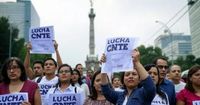The national strike organized by teachers in Mexico has resulted in a large-scale suspension of classes across various states, primarily affecting students in pre-school, primary, and secondary education. This initiative, called by the Sindicato Nacional de Trabajadores de la Educación (SNTE) and the Coordinadora Nacional de Trabajadores de la Educación (CNTE), aims to pressure the government for significant reforms within the educational landscape.
The strike, set from March 19 to March 21, 2025, will see students in the affected states—Chiapas, Chihuahua, and Zacatecas—missing a total of five class days due to the overlapping national break scheduled from March 21 to March 23. "This strike is not a symbolic action. It is an organized and combative response to the indifference and deception of the government regarding our demands," stated a representative of CNTE, emphasizing the seriousness behind the protest.
As schools in Chiapas, Chihuahua, and Zacatecas prepare for the strike, parents and students are already feeling the impact. According to the Secretaría de Educación Pública (SEP), activities in these states will effectively come to a halt as teachers participate in demonstrations aimed at influencing educational policy.
The CNTE and SNTE are rallying against the proposed reforms to the Ley del ISSSTE (Institute of Social Security and Services for State Workers), pushing for the abrogation of not just the recent proposed reform for 2025 but also the Ley del ISSSTE established in 2007, along with previous educational reforms endorsed by earlier administrations. Their primary demands include a 100% increase in base salaries for teachers and the establishment of a dignified, intergenerational pension system.
In a related development, President Claudia Sheinbaum announced just ahead of the strike that her administration would withdraw the reform to the Ley del ISSSTE following dialogue with the CNTE. "The president has announced the withdrawal of the ISSSTE reform after dialogue with the CNTE," she stated in a public address, demonstrating a responsive approach to the teachers' concerns.
The repercussions of this national strike are not limited to classroom closures; they also involve a significant march planned for March 19. The CNTE is organizing a "march-plantón" that will commence at 9:00 hours, beginning at the Congreso de la Unión and proceeding toward Palacio Nacional. This public demonstration is expected to attract thousands of participants and potentially disrupt traffic in the heart of Mexico City.
Loyal to their cause, teachers from Chiapas are among the most visibly mobilized, likely marching side by side with their counterparts from Oaxaca, where local demonstrations are also planned. In Zacatecas, protest activities indicate a full cessation of educational operations in alignment with the CNTE’s directives. Meanwhile, reports suggest that while some schools in Guerrero are maintaining regular schedules, public schools are being engulfed in the wave of protests.
Students across the affected states are set for an extended break, with the strike adding to the pre-existing breaks in the academic calendar of March 21 to 23, which focuses on grading periods. This means many students will not be returning to the classroom until March 24, creating a five-day 'megapuente' that many families might utilize for vacation plans.
Despite some schools potentially remaining open beyond these designated breaks, the merging of these protest days with scheduled breaks indicates a larger battle for educational integrity and reforms in Mexico. Teachers have expressed frustration with what they perceive as lacking government support and action regarding their wages and working conditions.
As these protests unfold, the outcomes will likely have long-term implications for how the Mexican government navigates educational reform and addresses the needs and grievances of its educators. Observers note that teacher strikes throughout history often reshape educational policies, and this instance could very likely pivot the trajectory of future reform efforts.
In a time rife with tension regarding educational reform, the camaraderie amongst educators as they rally for their demands serves as a testament to the ongoing struggle for acknowledgment and reward in the teaching profession. The upcoming days will be pivotal not only for the educators involved but for the entire educational system in Mexico as it stands at a crossroads.
As the 72-hour strike looms, it remains to be seen how effective the collective voice of the educators will be in influencing policy changes. With a heavy heart, teachers vow to continue their fight for better conditions, hoping their united front will yield the desired changes and acknowledgment from the government.



